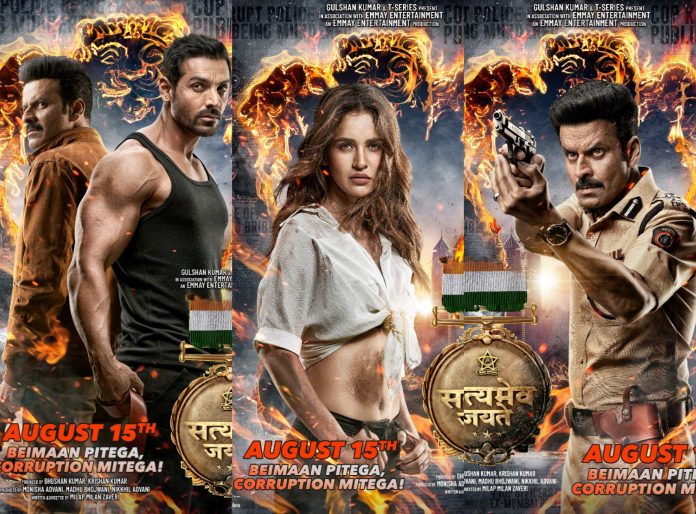T-Series and Emmay Entertainment’s Satyameva Jayate (A) is a lone crusader’s action against corruption.
Vir (John Abraham) is an angry young man. He detests corruption in general and corrupt police officers in particular. He, therefore, takes law into his hands and burns the corrupt police officers alive one after another. Police inspector Devansh (Manoj Bajpayee) is put in charge of the case but despite his best efforts to trace the killer, he draws a blank. And this, in spite of the fact that the murderer telephones Devansh and speaks with him about the murders. Soon, Devansh realises that there is a specific pattern in the murders and this at least makes his task a bit easier.
Soon, there’s a twist in the tale. And then, there’s another twist in the tale. But what happens finally? Is Devansh able to nab Vir? What is Vir’s reason for killing the corrupt policemen?
Milap Milan Zaveri has written a clichéd story about good versus evil with some additional twists and turns which again are not novel. In fact, his story is nothing but a recreation of similar films made in the 1970s, 1980s and 1990s. Resultantly, there is not even a hint of freshness in the story. However, to his credit, it must be added that Milap has infused the story with strong Muslim sentiments which will appeal to the masses and Muslim audiences. His screenplay again treads the beaten path and although it pretends to offer the tried-and-tested subject in a fresh avatar, the fact is that it is not fresh. The biggest drawback of the screenplay, when the second suspense (why Vir kills corrupt police officers) is revealed, the intelligent viewers fail to understand how his actions can in any way be related to the incident which is sought to be connected by the writer. Yes, Vir does kill one person whom he should have killed but what’s his justification in killing the numerous other corrupt police officers. No, there’s no problem in eliminating the corrupt uniformed persons but the connection between Vir’s problem and his killing spree just doesn’t seem to happen. No doubt, Vir’s efforts to wipe out corruption are laudable but that’s not the issue here. The issue is that writer Milap Milan Zaveri tries to justify his killings of the corrupt police officers by showing something about his past. Now, however hard the audiences may try to understand the connection, they will not be able to because there isn’t any connection except in the case of one last murder. On the plus side, the Muslim sentiments in the first half (the Muslim mother cursing the evil police officer who is mercilessly torturing her innocent son and then doing the namaz at the police station itself) and the long Muharram sequence after interval are both very effective to cater to the Muslim mass audience base. Milap Milan Zaveri’s dialogues are mass-oriented and also clapworthy from their viewpoint.
John Abraham does quite well in the role of Vir. He breathes fire into the action and stunt sequences. Manoj Bajpayee is good but for a long time, it appears as if he doesn’t have anything worthwhile to do. Aisha Sharma makes a dull debut as Vir’s love interest, Shikha. She has not been photographed too well and her dialogue delivery is also found lacking. Manish Chaudhary does a fair job as the commissioner of police. Chetan Pandit (in the role of police officer Shiv) is effective. Amruta Khanvilkar (as Sarita), Rajesh Khera (as police officer Bhonsle), Neetu Pandey (as the Muslim mother), Jay Joshi (as the Muslim son, Aslam), Archita Agarwal (as the Muslim girl), Devdatta Nage (as police inspector Gaikwad), Ankur Sharma (as police inspector Mohan Srivastav), Abhishek Khandekar (as Sadashiv Patil), Shaikh Sami Usman (as Irrfan Qadri), Uday Nene (as Shinde), Ratnesh Mani (as DCP Rane), Ganesh Yadav (as Damle), master Arash Shukla (as young Vir), master Tirth Josisher (as young Shivansh), master Chetan Rathod and master Krish Soni (both as kids in the society) make their marks in brief roles.
Milap Zaveri’s direction is limited by the hackneyed script. But it must be said to his credit that he has made a film of the kind which filmmakers have long forgotten and has thereby succeeded in catering to the hardcore masses, particularly the Muslim audience. Musically, the ‘Dilbar’ remixed version (Tanishk Bagchi) is the best song in the film and its picturisation on Nora Fatehi is eye-filling. The other songs (Sajid-Wajid, Rochak Kohli and Arko) are alright. Lyrics (Shabbir Ahmed, Kumaar and Arko) are fair. Song picturisations (by Adil Shaikh) are okay except for the ‘Dilbar’ song which has been beautifully choreographed. Sanjoy Chowdhury’s background music is impactful. Nigam Bomzan’s cinematography is good. Action and stunt scenes (by Amin Khatib and Ravi verma) are quite gruesome and although they will keep a section of the ladies and family audiences away, they will appeal to the masses. Priya Suhas’ production designing and Vijay Ghodke’s art direction are quite nice. Maahir Zaveri’s editing is okay.
On the whole, Satyameva Jayate is a run-of-the-mill mass entertainer but it has Muslim sentiments in abundance and the hit ‘Dilbar’ song to see it through, that too comfortably. In other words, it will pay dividends to all concerned.





























